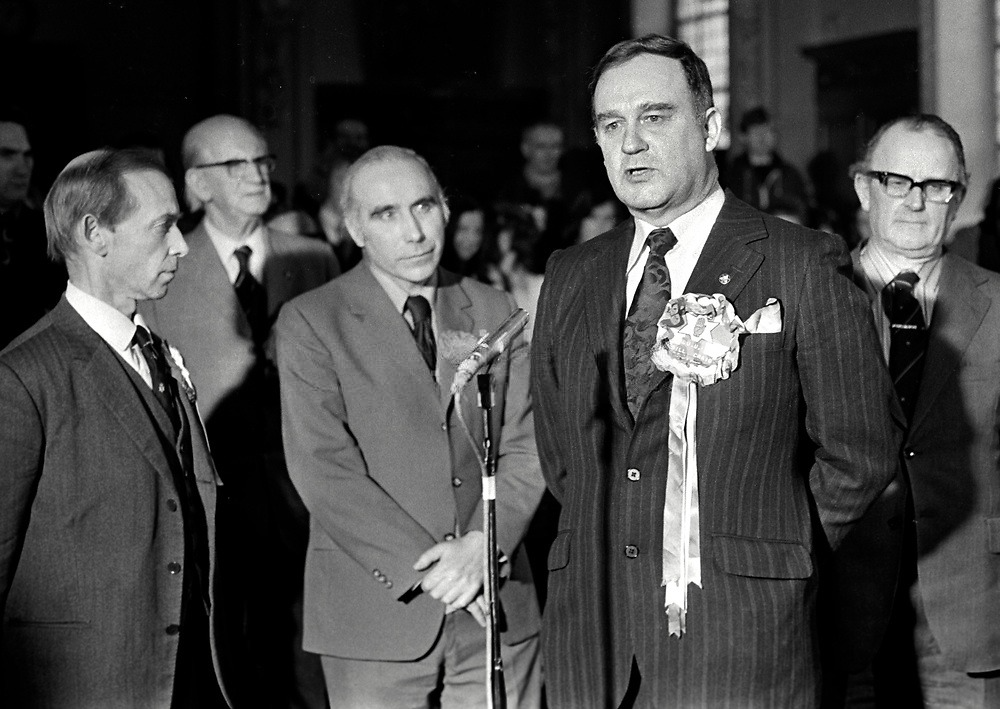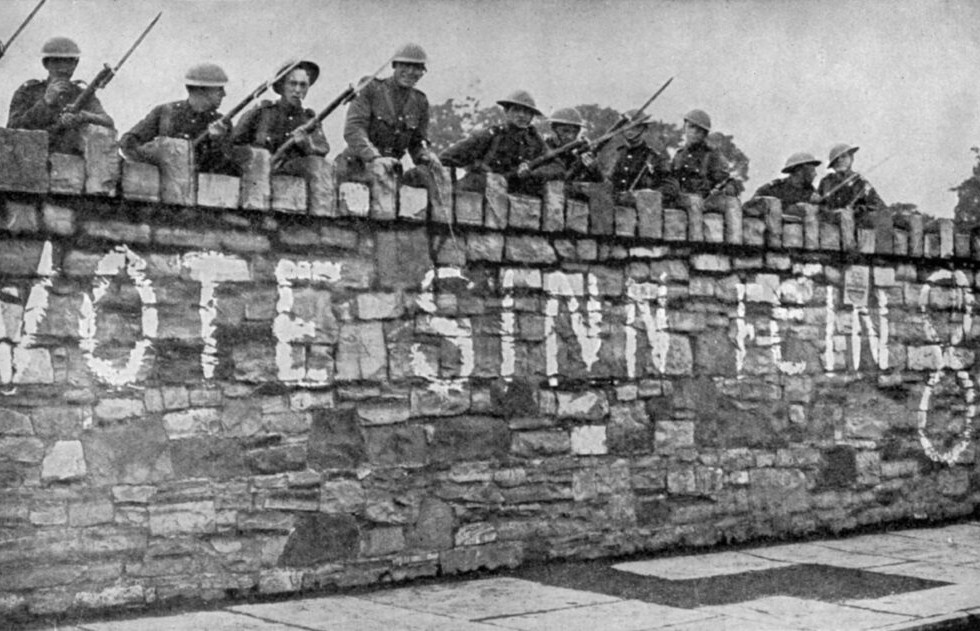Photo AI
Last Updated Sep 26, 2025
Political Developments in the Late 1970's Simplified Revision Notes for Leaving Cert History
Revision notes with simplified explanations to understand Political Developments in the Late 1970's quickly and effectively.
443+ students studying
Political Developments in the Late 1970's
Political Developments Under Roy Mason
- Roy Mason served as Secretary of State for Northern Ireland from 1976 to 1979, a time marked by intense violence during the Troubles.
- Mason was successful in reducing the number of violent incidents, largely due to his firm stance on security. However, despite these achievements in maintaining order, Mason struggled to make meaningful political progress.
- His approach focused on maintaining the status quo—keeping things as they were—rather than pursuing bold political changes. This contributed to a sense of stagnation in Northern Ireland during the late 1970s.
- While Mason faced criticism for not achieving political breakthroughs, it's important to recognise that he was working within a deeply divided society with limited options.
- During Mason's tenure, the British political landscape showed a rare moment of unity. Both the Conservative and Labour parties agreed to a bi-partisan approach to Northern Ireland, meaning they supported each other's efforts at political reform.
- However, this cooperation ended in 1977 when Conservative politician Airey Neave announced that his party would no longer back Mason's plans for a new power-sharing government.
- Instead, Neave advocated for a return to local government that aligned more closely with unionist interests, particularly those of the Ulster Unionist Party (UUP). This shift complicated efforts to reach a broader political solution.
- Despite the lack of movement towards ending Direct Rule—where Northern Ireland was governed directly from Westminster—Mason's time in office saw significant developments within both the unionist and nationalist communities. These changes would set the stage for future political shifts in the region.
Unionist Politics in the Late 1970s
-
In the late 1970s, unionist politics in Northern Ireland was dominated by the United Ulster Unionist Council (UUUC), a coalition of unionist groups that had considerable influence. However, by 1977, this coalition began to break apart.
- William Craig's Vanguard Progressive Unionist Party disbanded, and some members rejoined the Ulster Unionist Party (UUP). This realignment within unionist politics allowed the Democratic Unionist Party (DUP), led by Ian Paisley, to emerge as a powerful force alongside the UUP.

- William Craig's Vanguard Progressive Unionist Party disbanded, and some members rejoined the Ulster Unionist Party (UUP). This realignment within unionist politics allowed the Democratic Unionist Party (DUP), led by Ian Paisley, to emerge as a powerful force alongside the UUP.
-
The UUP itself was divided during this period. Some members wanted to maintain Direct Rule, where Northern Ireland was governed directly by the British government. In contrast, others wanted to restore the Stormont Parliament, giving unionists control over Northern Ireland's government. In 1979, James Molyneaux became the leader of the UUP.
-
He supported an integrationist approach, meaning that Northern Ireland would continue to be governed as part of the United Kingdom without a separate local government.
-
At the same time, James Callaghan was the British Prime Minister, having taken over after Harold Wilson resigned in 1976.
-
Callaghan's Labour government had a very slim majority in Parliament, making it difficult to push through significant changes. To win political support, Callaghan promised to increase Northern Ireland's representation in Westminster, raising the number of Members of Parliament (MPs) from 12 to 17.
-
However, despite these promises, Callaghan's government struggled to effectively engage with the complex politics of Northern Ireland, as it was heavily focused on addressing economic problems in Britain.
Developments in the Republican Movement
- By the late 1970s, the republican movement in Northern Ireland began to rethink its strategy. It became increasingly clear that the Provisional IRA's campaign of violence alone was unlikely to achieve the goal of a united Ireland in the near future.
- A key figure in this strategic shift was Gerry Adams, who advocated for a stronger emphasis on political engagement alongside the armed struggle.
- Adams had been interned—held in prison without trial—from 1973 to 1976. During this time, he became convinced that the republican movement needed to be more involved in politics.
- In 1976, the Provisional IRA reorganised itself under a new Northern Command, which operated separately from the group's leadership in Dublin. IRA members began working in small, secretive units known as cells.
- These cells were designed to reduce the risk of infiltration by the British security forces. This reorganisation was part of a broader strategy known as the Long War, which aimed to sustain pressure on the British government to withdraw from Northern Ireland.
- While the IRA was focused on its military campaign, Adams also worked to shift Sinn Féin—the political wing of the republican movement—towards addressing economic and social issues that affected working-class Catholics.
- In 1978, Adams was elected vice-president of Sinn Féin. He argued that it was not enough for the IRA to continue its violent campaign without a strong political strategy to complement it.
- Adams believed that having a robust political arm would help to legitimise the IRA's efforts and increase pressure on the British government to negotiate.
- This shift in focus laid the groundwork for Sinn Féin's future role in the peace process as the republican movement began to place more emphasis on political solutions rather than solely relying on violence.

Key Terms Defined
- Status quo: This term refers to the existing state of affairs or the current situation, particularly when there is no significant change or progress.
- Bi-partisan: A bi-partisan approach involves cooperation between two major political parties, often to achieve a common goal or address an issue that affects the nation as a whole.
- Direct Rule: Direct Rule in Northern Ireland meant that the region was governed directly by the British government in Westminster rather than through a local, devolved government.
- Ulster Unionist Party (UUP): The UUP is a major unionist political party in Northern Ireland, traditionally representing those who support maintaining Northern Ireland's status as part of the United Kingdom.
- United Ulster Unionist Council (UUUC): The UUUC was a coalition of unionist political groups in Northern Ireland that united to oppose power-sharing and to maintain Northern Ireland's union with Britain.
- Vanguard Progressive Unionist Party: A unionist political party in Northern Ireland, led by William Craig, that was active during the early 1970s and advocated for strong unionist policies before disbanding in 1977.
- Stormont: Stormont is the seat of the Northern Ireland Assembly and the executive government. The term is often used to refer to the Northern Ireland Parliament, which was suspended in 1972.
- Democratic Unionist Party (DUP): The DUP is a unionist and Protestant political party in Northern Ireland, founded and led by Ian Paisley, known for its hardline stance against power-sharing with nationalists.
- Integrationist: This term describes the approach of integrating Northern Ireland more fully into the United Kingdom rather than seeking separate governance or increased autonomy.
- Republican: In the context of Northern Ireland, republican refers to individuals or groups who support the idea of a united Ireland, free from British rule.
- Provisional IRA: The Provisional Irish Republican Army (IRA) was a paramilitary organisation that sought to end British rule in Northern Ireland and reunify Ireland through armed struggle.
- Northern Command: A division of the Provisional IRA that operated in Northern Ireland, focusing on military operations independent of the organisation's leadership in Dublin.
- Cells: In the context of the IRA, cells refer to small, secretive groups of militants who operated independently to reduce the risk of being infiltrated by security forces.
- Long War: A strategy adopted by the IRA to sustain a prolonged campaign of violence and political pressure aimed at forcing the British government to withdraw from Northern Ireland.
- Sinn Féin: Sinn Féin is a political party in Ireland that has historically been associated with the republican movement and the IRA. It advocates for Irish unification and has become a significant political force.
500K+ Students Use These Powerful Tools to Master Political Developments in the Late 1970's For their Leaving Cert Exams.
Enhance your understanding with flashcards, quizzes, and exams—designed to help you grasp key concepts, reinforce learning, and master any topic with confidence!
488 flashcards
Flashcards on Political Developments in the Late 1970's
Revise key concepts with interactive flashcards.
Try History Flashcards56 quizzes
Quizzes on Political Developments in the Late 1970's
Test your knowledge with fun and engaging quizzes.
Try History Quizzes29 questions
Exam questions on Political Developments in the Late 1970's
Boost your confidence with real exam questions.
Try History Questions27 exams created
Exam Builder on Political Developments in the Late 1970's
Create custom exams across topics for better practice!
Try History exam builder117 papers
Past Papers on Political Developments in the Late 1970's
Practice past papers to reinforce exam experience.
Try History Past PapersOther Revision Notes related to Political Developments in the Late 1970's you should explore
Discover More Revision Notes Related to Political Developments in the Late 1970's to Deepen Your Understanding and Improve Your Mastery
96%
114 rated
Stalemate and a search for peace 1974-84
Direct Rule and the Ulster Convention
368+ studying
196KViews96%
114 rated
Stalemate and a search for peace 1974-84
IRA Bombing Campaigns in Guildford and Birmingham
250+ studying
197KViews96%
114 rated
Stalemate and a search for peace 1974-84
Roy Mason - Peace in Northern Ireland?
343+ studying
187KViews96%
114 rated
Stalemate and a search for peace 1974-84
The Warrenpoint Ambush - Lord Mountbatten is killed
329+ studying
192KViews